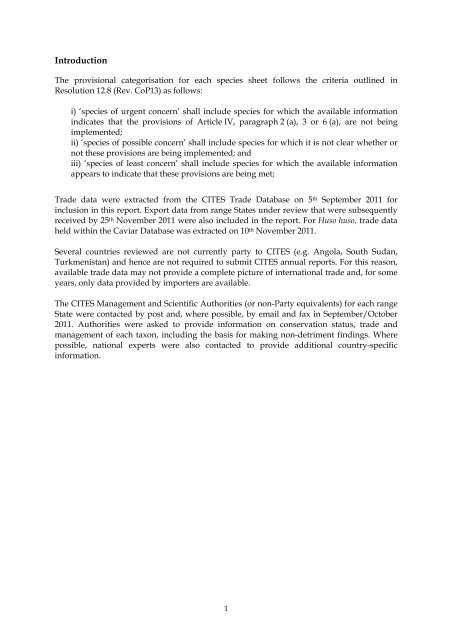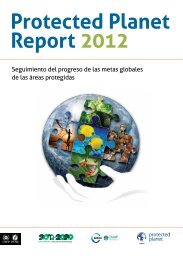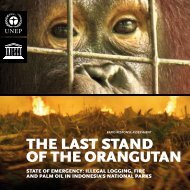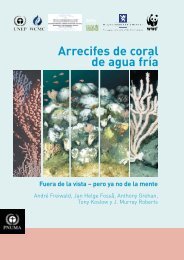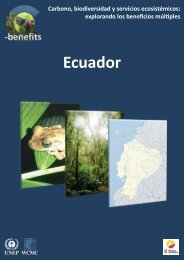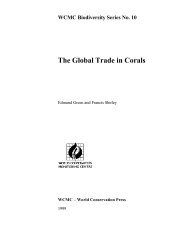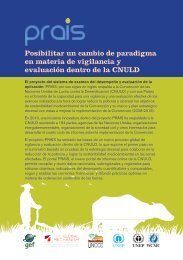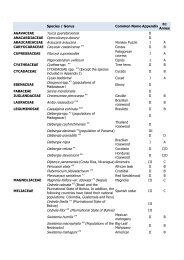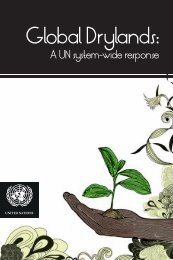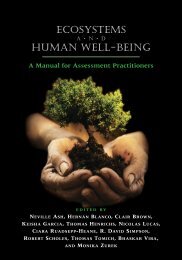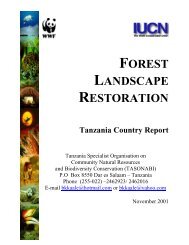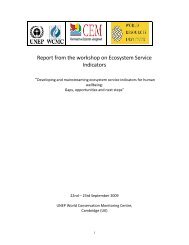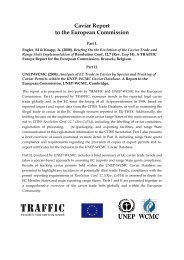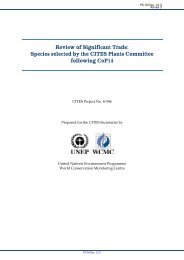- Page 1 and 2: AC26 Doc. 12.2 Annex Review of Sign
- Page 3: Contents Introduction .............
- Page 7 and 8: Tursiops aduncus In an interim repo
- Page 9 and 10: Tursiops aduncus Islands. According
- Page 11 and 12: Tursiops aduncus SPREP (South Pacif
- Page 13 and 14: Tursiops aduncus Solomon Islands Mi
- Page 15 and 16: Balearica pavonina Range State Erit
- Page 17 and 18: Balearica pavonina were considered
- Page 19 and 20: Balearica pavonina Williams et al.
- Page 21 and 22: Balearica pavonina Population trend
- Page 23 and 24: Balearica pavonina population trend
- Page 25 and 26: Balearica pavonina Importers report
- Page 27 and 28: Balearica pavonina revealed that fe
- Page 29 and 30: Balearica pavonina of the species r
- Page 31 and 32: Balearica pavonina Table 2. Estimat
- Page 33 and 34: Balearica pavonina 2011) reported t
- Page 35 and 36: Balearica pavonina Eljack, A. O. 19
- Page 37 and 38: Balearica pavonina Williams, E., Be
- Page 39 and 40: Balearica regulorum Range State Uga
- Page 41 and 42: Balearica regulorum flooded grassla
- Page 43 and 44: Balearica regulorum In both 1985 an
- Page 45 and 46: Balearica regulorum Management: The
- Page 47 and 48: Balearica regulorum and trading pro
- Page 49 and 50: Balearica regulorum Management: The
- Page 51 and 52: Balearica regulorum Beilfuss, R. D.
- Page 53 and 54: Balearica regulorum Morrison, K. 20
- Page 55 and 56:
Mantella aurantiaca Mantella aurant
- Page 57 and 58:
Mantella aurantiaca Figure 1. Histo
- Page 59 and 60:
Mantella aurantiaca According to da
- Page 61 and 62:
Mantella aurantiaca to be any mis-i
- Page 63 and 64:
Mantella aurantiaca Jenkins, M. D.
- Page 65 and 66:
Huso huso Huso huso (Linnaeus, 1758
- Page 67 and 68:
Huso huso Range State Russian Feder
- Page 69 and 70:
Huso huso the Secretariat; therefor
- Page 71 and 72:
Huso huso specimen was found. Due t
- Page 73 and 74:
Huso huso Table 6. CITES export quo
- Page 75 and 76:
Huso huso for Fisheries and Aquacul
- Page 77 and 78:
Huso huso Management: A total ban o
- Page 79 and 80:
Huso huso THE ISLAMIC REPUBLIC OF I
- Page 81 and 82:
Huso huso Table 14. Direct trade in
- Page 83 and 84:
Huso huso Management: The managemen
- Page 85 and 86:
Huso huso permit date available). I
- Page 87 and 88:
Huso huso Table 23. CITES export qu
- Page 89 and 90:
Huso huso Table 26. Direct trade in
- Page 91 and 92:
Huso huso Management: Commercial ha
- Page 93 and 94:
Huso huso delta. Environmental Biol
- Page 95 and 96:
Huso huso Khodorevskaya, R. P., Kra
- Page 97 and 98:
Huso huso Mediterranean.Rome[STUD.R
- Page 99 and 100:
Hippocampus kelloggi Range State Th
- Page 101 and 102:
Hippocampus kelloggi Hippocampus sp
- Page 103 and 104:
Hippocampus kelloggi Coromandel Coa
- Page 105 and 106:
Hippocampus kelloggi 2003). Threats
- Page 107 and 108:
Hippocampus kelloggi UNITED REPUBLI
- Page 109 and 110:
Hippocampus kelloggi (Giles et al.,
- Page 111 and 112:
Hippocampus kelloggi Motomura, H.,
- Page 113 and 114:
Hippocampus kuda Hippocampus kuda B
- Page 115 and 116:
Hippocampus kuda Range State Provis
- Page 117 and 118:
Hippocampus kuda A clear understand
- Page 119 and 120:
Hippocampus kuda domestic use (CITE
- Page 121 and 122:
Hippocampus kuda WCMC, 2011). Manag
- Page 123 and 124:
Hippocampus kuda Management: Syngna
- Page 125 and 126:
Hippocampus kuda Germany in 2004 fo
- Page 127 and 128:
Hippocampus kuda Management Act 199
- Page 129 and 130:
Hippocampus kuda considered to be n
- Page 131 and 132:
Hippocampus kuda (1999a; 2004), how
- Page 133 and 134:
Hippocampus kuda Source: T. M. Vuon
- Page 135 and 136:
Hippocampus kuda Ganiga, G. 2006. A
- Page 137 and 138:
Hippocampus kuda Nijman, V. 2010. A
- Page 139 and 140:
Hippocampus spinosissimus Hippocamp
- Page 141 and 142:
Hippocampus spinosissimus considere
- Page 143 and 144:
Hippocampus spinosissimus (Project
- Page 145 and 146:
Hippocampus spinosissimus Trade: Ac
- Page 147 and 148:
Hippocampus spinosissimus permits a
- Page 149 and 150:
Hippocampus spinosissimus (T. M. Vu
- Page 151 and 152:
Hippocampus spinosissimus Lourie, S
- Page 153 and 154:
Pandinus imperator Pandinus imperat
- Page 155 and 156:
Pandinus imperator Polis (1990) not
- Page 157 and 158:
Pandinus imperator in outdoor enclo
- Page 159 and 160:
Pandinus imperator Threats: No info
- Page 161 and 162:
Pandinus imperator GUINEA Distribut
- Page 163 and 164:
Pandinus imperator Table 4. Direct
- Page 165 and 166:
Pandinus imperator E. References Br
- Page 167 and 168:
Tridacna spp. Tridacna spp.: Solomo
- Page 169 and 170:
Tridacna spp. Furthermore, some aut
- Page 171 and 172:
Tridacna spp. species Hippopus hipp
- Page 173 and 174:
Tridacna spp. A number of actions w
- Page 175 and 176:
Tridacna spp. Islands have been rep
- Page 177 and 178:
Tridacna spp. Management: The expor
- Page 179 and 180:
Tridacna spp. imported between 2007
- Page 181 and 182:
Tridacna spp. Wabnitz et al., 2003;
- Page 183 and 184:
Tridacna spp. Table 5. Direct trade
- Page 185 and 186:
Tridacna spp. Clams (Tridacnidae) a
- Page 187 and 188:
Tridacna spp. SPC Aquaculture Porta


